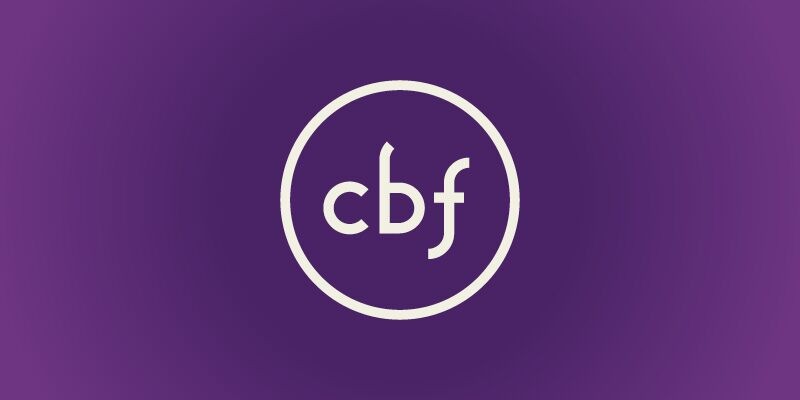By Blake Tommey
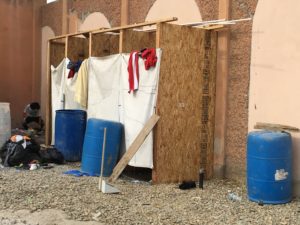
Public showers were constructed in El Barretal through a partnership with Juvenal González, the San Diego Southern Baptist Association and CBF.
On November 14, the “caravan” of Central American migrants arrived at the United States’ southern border in Tijuana, Mexico. Most sought to file an asylum claim, which the U.S. is legally obligated to hear from migrants fleeing violence. Some intended to cross the border by any means necessary. Few wished to return to their home countries of Honduras, Guatemala and El Salvador, where brutality and coercion run rampant. All, however, would languish in mass shelters as the Department of Homeland Security announced in December that asylum-seekers must await their claim review in Mexico—a process that can now take more than a year to complete.
“It’s a messy situation of 38 to 40 different refugee camps for around 6,000 people,” said Rubén Ortiz, Cooperative Baptist Fellowship’s Latino Field Coordinator, who visited Tijuana in December.
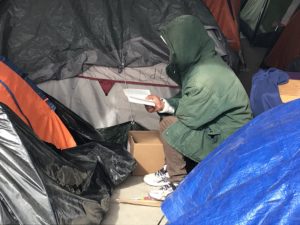
Immigrants sit and wait at the Mexico border as they seek asylum status in the U.S. They wait in makeshift refugee camps like El Barretal full of tents, with little access to food.
Tijuana’s mayor quickly declared a humanitarian crisis, as thousands chose to wait in improvised government shelters filled with pop-up tents and little food. That’s when Ortiz, Glen Foster, coordinator of CBF West, Marv Knox, coordinator of Fellowship Southwest, and Jorge Zapata, associate coordinator of CBF Texas, traveled to Tijuana to learn more about the migrants and to partner with those already serving in the refugee camps.
Initially, CBF joined forces with local congregations and leaders who are offering “daily bread” to migrants and contributed funding to their ongoing work. Those immediate efforts include a feeding ministry coordinated by Juvenal González, a church-starter with the San Diego Southern Baptist Association. Each morning, González and volunteers from Baptist congregations in Tijuana provide a hot meal for the estimated 2,000 migrants residing in and around El Barretal, a government-run shelter created after a sports complex yards from the border became overrun with trash and sewage.
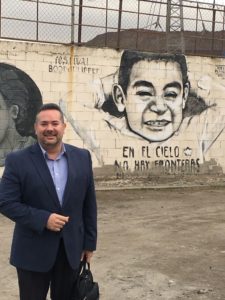
Rubén Ortiz, CBF Latino Field Coordinator, stands in front of the border wall, which reads, “In Heaven, there are no borders.”
In addition to food, González also coordinated the construction of public showers in El Barretal, for which Fellowship Southwest contributed $5,000. More recently, Fellowship Southwest provided one month’s apartment rent for 10 Central American families who have received work visas and are in the process of obtaining asylum in Mexico.
Ultimately, CBF not only cares about feeding Tijuana’s stalled migrants today, but about the future of every family and individual seeking refuge at our southern border, Ortiz explained. The question is, he says: How can the Fellowship offer long-term partnership in Tijuana and engage the deeper issues on either side of the stalemate?
“We want to give the bread and ask the questions,” Ortiz said. “How we can meet these people personally and know their stories?”
“Why did they leave their countries? What is happening in their countries that we can collaborate on as good neighbors? Where are they going if they cross the border through the U.S. asylum process? What church or community will be working on the U.S. side of the border to help them and open our doors to the stranger? That’s my concern, and that is CBF’s approach. It’s not only about the bread of today but about the whole future of a person.”
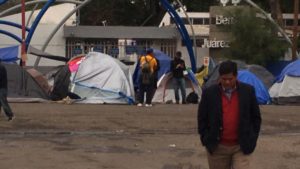
Juvenal González, a church starter with the San Diego Southern Baptist Association, pictured at the Benito Juarez refugee camp just yards from the U.S.-Mexico border.
Those are the questions Ortiz brought back to pastors of the San Diego Southern Baptist Association in February as they discussed ways to grow their response in Tijuana. Together, CBF and local partners like the SDSBA must adopt a holistic approach, Ortiz said, in which faith leaders can meet migrants face-to-face, learn about their situations and respond as they await an asylum claim or return to their home country.
Ortiz and fellow pastors also explored conflict resolution methods for their own congregations, which are just as polarized as the rest of the country, he explained. As the immigration conversation continues to boil over, CBF’s network of Latino churches has a unique responsibility, he emphasized—a calling to model their communal faith and help soothe the fear that has taken hold in the United States. Serving migrants in Tijuana is only one way the Latino community can restore compassion and understanding.
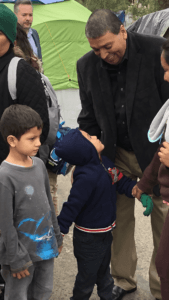
Jorge Zapata, Associate Coordinator for CBF Texas, plays with children in Tijuana, Mexico, where thousands of immigrants wait.
“We are here, and we need to show who we are, because who we are is healing; it is medicine for churches in the United States,” Ortiz explained of CBF’s Latino Network.
“Latino churches need to model for the whole family what it is to be an immigrant. Many of our churches are doing great—on attendance, on commitment, on holistic missions in the community, on development. This is part of the DNA of immigrants, so don’t be afraid. We are here, working side by side with you to support you and to show you a communal way to be Christian. In fact, that’s the only way to be Christian.
“In our home countries, we are more than an institution,” he added, “we are agents of transformation. We bring that to United States, and we bring that to CBF.”
Learn more about and make a financial gift to support CBF’s ministry to immigrants and refugees from Central America here.
The Cooperative Baptist Fellowship is a Christian Network that helps people put their faith to practice through ministry efforts, global missions and a broad community of support. The Fellowship’s mission is to serve Christians and churches as they discover and fulfill their God-given mission. Learn more at www.cbf.net.


